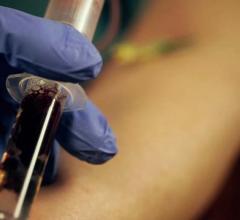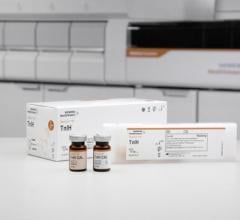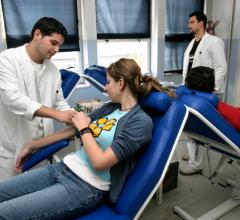April 22, 2013 — The results of a pivotal benchmark study of Silicon BioDevices’ digital handheld device for high-sensitivity measurement of cardiac troponin-I, a protein found in the heart muscle used to identify heart tissue damage in patients suspected of having a heart attack, showed that the totally integrated, single-use device was able to provide troponin blood test results in one step directly from a drop of blood in 15 minutes with performance comparable to clinical lab instrumentation.
"Silicon BioDevices is solving a key problem of point-of-care diagnostics — the tradeoff of speed versus quality in making critical-care decisions," said Ronald M. Krauss, M.D., senior scientist and director of atherosclerosis research at Children's Hospital Oakland Research Institute, adjunct professor at the University of California San Francisco and an advisor to the company. "For the treatment of a coronary event, getting to that decision significantly sooner will be a major healthcare benefit."
Aimed at capturing a significant share of the $45 billion dollar in vitro diagnostics market, the handheld device can be engineered to measure from a single drop of whole blood a myriad of other biomarkers for heart failure, pulmonary embolism and deep vein thrombosis, sepsis and other conditions where speed and quality of results are critical to patient care. According to the College of American Pathologists, the demand for point-of-care (POC) tests is now growing at 12-16 percent per year with one in four tests being performed at the POC.
Rapid and sensitive testing of cardiac troponin has become the cornerstone for diagnosing patients suspected of having a heart attack. As many as 9 million emergency room patients are tested annually for suspected heart attack at a cost of nearly $13 billion. The length of time to diagnose a coronary event is a crucial factor because heart muscle begins to die shortly after being deprived of blood, eventually causing irreversible damage. Nearly 500,000 Americans die annually of coronary artery disease, and 1 million suffer an acute coronary event such as a heart attack or sudden cardiac death, according to the American Heart Association. Annual rates indicate 785,000 will have their first heart attack, and another 470,000 will have another attack this year. About 195,000 will experience a "silent" heart attack without complaining of chest pain.
Silicon BioDevices' test device is a fully integrated, immunoassay detection system based on a computer chip. With the potential to house up to 100,000 single-molecule sensors, each about 100th the cross-sectional area of human hair, the device has the ability to count single molecules one at a time. Its on-chip integration of all analytical functions eliminates the need for an external instrument or reader, thus greatly simplifying the use of the device and reducing its manufacturing cost.
Encryption and wireless transmission functions can be integrated so digitized data can be sent wirelessly to any remote display such as a smart phone, tablet, or computer-based electronic medical record. Since the device requires only one integrated computer chip, a battery and a digital display, it can be designed to conform to any form factor such as a thumb-drive or smart phone.
"Silicon BioDevices' digital technology promises to extend clinical lab-quality testing by caregivers and patients alike to any setting — including the home," explained Gary Stroy, CEO of Silicon BioDevices. "Its ability to extract plasma from whole blood efficiently for both single- and multiple-target testing is a key feature that has limited other POC technologies. This technology has the potential to usher in a whole new era of near-patient testing that will allow many more tests to move from the central lab to the point-of-care."
For more information: www.siliconbiodevices.com


 October 09, 2019
October 09, 2019 








